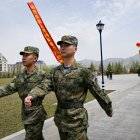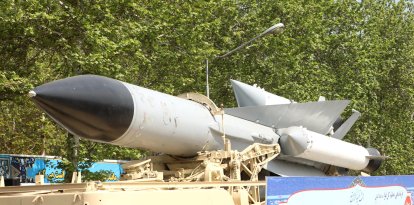Pentagon prioritizes Taiwan's defense in its new military strategy
The document states that the US will reinforce its presence in the Indo-Pacific, strengthen the defense of its bases in the region, and pressure the island to increase its military spending.

US Defense Secretary Pete Hegseth.
A classified Pentagon memo reveals a shift in US military strategy pushed by Defense Secretary Pete Hegseth, who prioritizes deterring a possible Chinese invasion of Taiwan, even if it means taking risks in other parts of the world, according to a report by The Washington Post.
The Pentagon's new guidelines reflect a more aggressive approach in the Indo-Pacific region, with an emphasis on bolstering the U.S. presence around Taiwan and deterring any attempts by Beijing to change the status quo by force. The strategy recognizes that this shift in priorities could involve reducing military resources in other regions.
The document, called the Interim Strategic National Defense Guidance, was circulated in March within the Defense Department. In it, Hegseth lays out a vision aligned with the Donald Trump Administration, focused on preparing for an eventual conflict with China and protecting key strategic regions, such as Greenland and the Panama Canal.
In addition, the guidance directs the military to take a more active role in immigration control and counter-narcotics, thus expanding the Pentagon's traditional roles beyond conventional defense.
Military Reorientation: Indo-Pacific as a Priority
Although previous administrations had already identified China as the main strategic threat, Hegseth's directive places the defense of Taiwan at the center of military policy. The Pentagon will bolster its presence in the Indo-Pacific with the deployment of submarines, bombers and specialized units. It will also strengthen the defense of U.S. bases in the region and pressure Taiwan to increase its military spending to 10% of its GDP.
The document urges European allies to increase their defense spending and take a more active role in deterring Russia, North Korea and Iran. It also states that counterterrorism operations will be limited to groups with the direct capability to attack the United States, leaving militants in Africa and the Middle East who, while generating instability, have no intention of launching international attacks on the back burner.

World
China deploys new weapons and tactics in its military escalation against Taiwan
Leandro Fleischer
Heritage Foundation Influence
An analysis of the paper reveals similarities to a 2024 report by Heritage Foundation, whose proposals on Taiwan, national defense and burden sharing among allies are reflected in Hegseth's guide. Alexander Velez-Green, co-author of the Heritage report, currently holds a key position at the Pentagon.
RECOMMENDATION






















